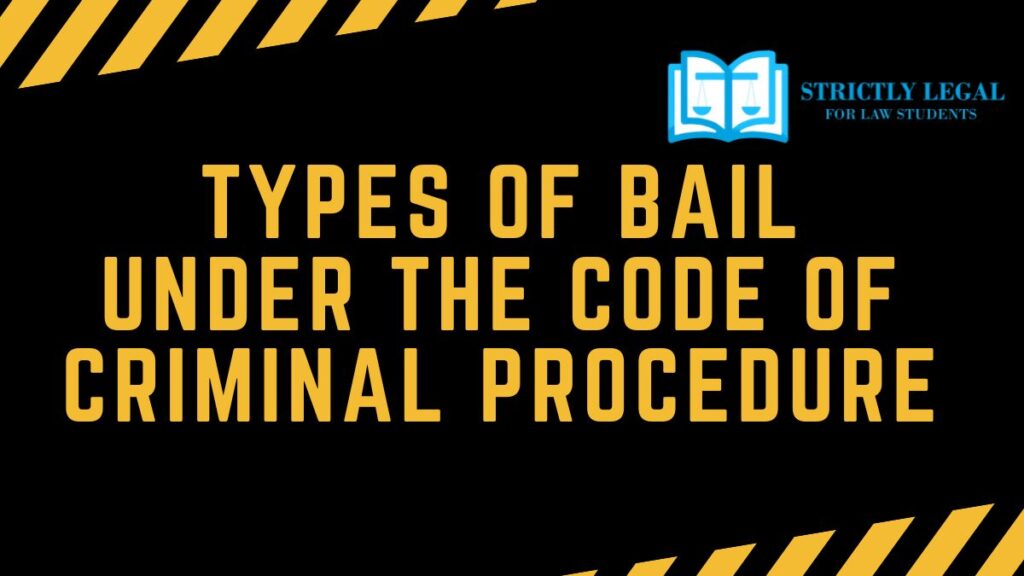In layman’s terms, Bail simply means the short term release of an accused person awaiting trial for an amount pledged for the appearance of the accused. Bail is the judicial release of an accused who is charged with certain specific offences by implying certain restrictions on him and gripping him to remain within the jurisdiction of the Court of Law. Getting bail is one of the rights of the accused in a Civil Case while it is upon the discretion of the granting authority when it comes to a criminal case. The concept of Bail was first introduced in England. India, after getting inspired by England also introduced the said concept. The Concept of Bail falls under the existential purview of Human Rights since the UN Declaration of Human Rights of 1948. The Law Commission managed the recommendations to the Parliament in its 41st report and the same were scrutinized and incorporated by the Parliament in the Code of Criminal Procedure, 1973 [herein after referred to as the code]. Rationalizing the laws on bail was organized in the structure of the basic principles of personal liberty to see that these are compendiously affected and a flexible mechanism altered to acquire attentiveness of the community through an exercise of judicial discretion.
Table of Contents
Categorization of Offenses
Offences have been categorized into two parts I.e., Bailable Offense and Non-Bailable Offense. The type of offences where the accused is accorded bail, guaranteed under Section 2(a) of the Code is called Bailable Offense whereas the type of offences where the accused is not entitled to get bail is known to be non-bailable offences.
Types of Bail in India
To be specific, there are three types of bail in India.
Regular Bail
When an individual commits a cognizable non-bailable offence, the police may take him to custody and post the custody period, the said person must be sent to jail. However, the right of the accused to be released from the custody here has been mentioned u/s 437 and 439 of the Code. Hence a regular bail is the release of the accused from the police custody to make sure his presence at the trial.
Interim Bail
This type of Bail is accorded for a short period of time and for temporary means, either during the pendency of an application or when the application of anticipatory or regular bail is pending before the Court. Interim bail is always conditional and may be extended, however, if it lapses before the accused has been asked for an anticipatory bail or regular bail and he refrains from paying the amount required for the continuation of the bail, then the accused loses his right of freedom and will be taken under custody.
Anticipatory Bail
Anticipatory Bail is self-identified. This is the type of bail which is accorded to someone who is in anticipation or expectation of getting arrested for a non-bailable offense by the police. This has been the most essential bail of current times since rivalries in business or other influential people often deem to charge opponents with false cases. This is an advanced bail mentioned u/s 438 of the Code. A person who has been accorded the Anticipatory Bail, cannot be arrested by the police.
Conditions in which Bail is granted in India
Chapter XXXIII of the Code of Criminal Procedure, covering from Sections 436 to 450 deals with bails and bonds. There are conditions in which bails can be granted and they are as follows:
Conditions for Getting Bail in a Bailable Offense
Section 436 (1) of the Code specifies the conditions under which bail can be accorded for bailable offences committed under the Indian Penal Code, 1862. “Whenever a person is arrested or detained by police for any non-bailable offence is produced before the court and he is prepared to give bail, he may be released on bail.”
Section 436 (2) of the Code specifies the conditions under which bail may be turned down irrespective of the offence being bailable in nature. “If a person fails to comply with the conditions of appearance as laid down in the bail-bond, he may, in any subsequent occasion in the same case, if arrested or brought before the court, be refused bail.”
Conditions for Getting Bail in a Non-Bailable Offense
Right to Liberty being one of the fundamental rights, as guaranteed by the Constitution of India required to be analyzed in conjugation, in contending if an accused can be granted bail with regards to a non-bailable offence. The Honorable Court of Law had to strike a balance between the two principles. The Apex Court in the case of Shahzad Hasan Khan v. Ishtiaq Hasan Khan (1987) contended that “Liberty is to be secured through a process of law, which is administered keeping in mind the interests of the accused, the near and dear of the victim who lost his life and who feel helpless and believe that there is no justice in the world as also the collective interest of the community so that parties do not lose faith in the institution and indulge in private retribution.”
Section 437 of the Code specifies that an accused in a non-bailable offence can also be accorded bail, nonetheless, it is the discretion of the Court of Law as to grant the bail or not and the right of the accused cannot be alleged as a matter of right. This Section further clarifies that, if a person is arrested without a warrant and produced before a court, any court other than the High Court or the Court of Sessions may grant him bail.
Conditions for getting Bail in anticipation for arrest
Section 438 of the Code specifies the procedure for getting bail in anticipation of arrest for a non-bailable offence. An element of anxiety shall be there, for example, the person asking for bail feels that he will be framed or arrested in a fabricated or false case or someone having some rivalry or enmity with him will try to get him arrested in a false case with a fabricated charge. The applicant has to present before the Court certain special facts or circumstances which make him believe would result in his arrest. This is however left to the satisfaction of the court if such facts would be considered good enough for granting bail.
Conclusion
Bail is an important aspect in the Criminal Justice System to make sure that no innocent person is convicted until proven guilty. But the complexity of the concept of bail the country often fails to acknowledge the same as accordance or turning down of bail depends on the factors that hardly connects with the merit of the case. The 268th Report of the recommendations of the Law Commission are necessary and they should be executed in order to maintain a fair and transparent system of bail in our criminal law system.

Law student.
Turning legal insights into engaging narratives.





